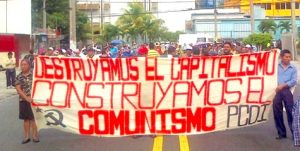Celebrate 1932 Communist-Led Uprising

EL SALVADOR— On January 22 we celebrate one of the most important revolutionary historical events in Latin America, the 1932 peasant uprising in western El Salvador. It was led by the Salvadoran Communist Party (SCP), founded on March 30, 1930, by Abel Cuenca, Miguel Mármol, Farabundo Martí and Modesto Ramírez. Another outstanding leader was the indigenous communist Feliciano Ama.
The SCP recruited many members, including industrial workers, farmworkers, shoemakers. They mobilized large concentrations of workers: 80,000 workers on May Day, 1930. They brought the needs of indigenous workers into the political struggle. Communist Party members from Mexico and Ecuador came to orient the Salvadoran comrades to Marxism-Leninism.
In the 1880s, the nascent oligarchy had dispossessed the peasants of the ejido lands (use for all) through government decrees. They concentrated the land in a few hands.
This gave rise to a new form of production called haciendas. Indigenous people were forced to work as exploited farmworkers, growing indigo in the lowlands and coffee in the highlands. Coffee was the most important crop, and the area was the center of coffee economies.
Fighting against anti-indigenous racism, organizing for communism
The 1920s saw increasing dispossession and racism. The state was taking away indigenous lands. It repressed indigenous people and kept them from speaking their Nahuatl language. Many left behind everything that identified them as farmworkers, although this process was not immediate.
The communists organized and structured the revolutionary effort. They formed the largest worker-farmworker alliance of the time to fight against the oligarchy. Some women resisted abandoning traditional dress, leading them to fight against repression and exploitation.
By 1930-31 the western zone was in a state of great agitation. Strikes broke out in the coffee areas because of massive firings and wage cuts caused by the 1929 worldwide Great Depression.
The farmworkers took control of military installations and towns such as Izalco, Juayua, Nahuizalco and Tacuba. This was the uprising of 1932.
The charge d’affaires of the United States in El Salvador reported that telephone and telegraphic communication was cut off and the English railway, near Sonsonate departmental capital in the west, was destroyed. The uprising was widespread among many populations. The US official assured his superiors that authorities were taking energetic measures to suppress the disturbances.
The US State Department, coordinating with the diplomatic delegations of Italy, the United Kingdom and Canada, sent warships from Panama to the Salvadoran coast. They were led by the cruiser Rochester, flagship of the special services division in the Canal Zone.
The Daily Worker, newspaper of the US Communist Party, declared that “every US worker must come to the aid of their fellow workers in El Salvador. Fighting there against US imperialism is part of the struggle of the American masses against wholesale hunger and wage cuts.”
It continued, “Support the Salvadoran workers and farmworkers. Fight against the terror of Wall Street and that of the rich exploiters: Let us demand the withdrawal of all troops from El Salvador.”
“The workers and farmworkers there are fighting against hunger, imposed by US imperialism,” it concluded. “Let us demand the withdrawal of the gunboats and marines! Stop the murder of workers and peasants! All the revolutionary support to the workers and peasants of El Salvador!”
The uprising of the masses was a very important battle against capitalism. It didn’t achieve all its objectives, and thousands were massacred. But the uprising lit the path for the communist revolutionary struggle ahead. It is an example for the working class to continue the struggle against racism by organizing for communism.
Ninety years after that heroic struggle, rebelliousness is emerging again with ICWP.
The International Communist Workers’ Party commemorates those who gave their lives to liberate the farmworkers, among them Feliciano Ama, Farabundo Martí (member of the International Relief and the Communist International), Zapata and Luna. All were shot as leaders of the uprising.
Our party is inspired by these struggles to continue organizing farmworkers and industrial workers to mobilize masses directly for communism. Communist society will abolish personal wealth. No one will exploit anyone. The communist world will have no nations, classes, racism, sexism, or exploitation.
We call on all workers of the world to organize in the International Communist Workers’ Party. It is time to end this rotten capitalist system and fight for the communist system we need.

